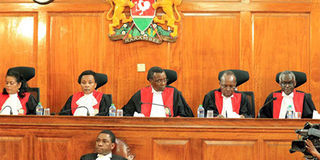Assault on independent agencies disastrous to policy stability

Supreme Court of Kenya judges before delivering a detailed judgement for annulling President Kenyatta's re-election on September 20,2017. Continued assault in independent bodies especially the Judiciary and IEBC is disastrous for the country's stability. PHOTO | JEFF ANGOTE | NATION MEDIA GROUP
What you need to know:
The IEBC is a product of long, painful electoral reforms that came at a massive public cost in terms of time, energy and resources. But despite significant progress — particularly in voter registration, identification and voting — a lot more needs to be done to establish a widely accepted electoral system.
Similarly, the Judiciary, which underwent long periods of upheavals linked to miscarriage of justice, has focused on improving the efficiency of the courts by reducing case delays, fighting corruption and increasing transparency of the court processes and decisions.
These reforms have focused more intensely on structural systems and processes of the IEBC and the Supreme Court but less on the human factor that drives, controls and directs the systems and processes.
The fallout from the Supreme Court nullification of the August 8 presidential election has exposed the vulnerability of independent public institutions to political machinations. It also raises queries about the impact of the reforms implemented, at great pains and cost, to improve the institutions’ performance.
Two institutions on the spot — the Independent Electoral and Boundaries Commission and the Supreme Court — are critical to Kenya’s development and how they discharge their mandate influences economic prosperity and social stability.
But the emerging public perception is how weak the IEBC and the Supreme Court are — not just in discharging their responsibilities but, more so, absorbing shocks from political attacks and possible manipulation.
They have failed to effectively respond to vicious attacks by Jubilee Party and the National Super Alliance, leaving the country at the mercy of an induced political crisis that has significantly eroded business confidence and stalled policy making for the future.
PUBLIC PERCEPTION
The tragedy is that the public perception about the two institutions is being driven by the political elite, who are sharply divided on the integrity of IEBC, which declared President Uhuru Kenyatta the winner, and the Supreme Court, which nullified the victory and ordered a fresh poll, handing Nasa’s candidate Raila Odinga another chance at the ballot.
Economic and social fundamentals don’t seem to feature in the political schemes, which have little respect for established order.
Public schools can be shut and millions of pupils sent home or national examinations postponed to give the political elite the space and latitude to sort out their differences.
The IEBC is a product of long, painful electoral reforms that came at a massive public cost in terms of time, energy and resources. But despite significant progress — particularly in voter registration, identification and voting — a lot more needs to be done to establish a widely accepted electoral system.
HUMAN FACTOR
Similarly, the Judiciary, which underwent long periods of upheavals linked to miscarriage of justice, has focused on improving the efficiency of the courts by reducing case delays, fighting corruption and increasing transparency of the court processes and decisions.
These reforms have focused more intensely on structural systems and processes of the IEBC and the Supreme Court but less on the human factor that drives, controls and directs the systems and processes.
It is the human spirit that is widely considered to have contributed to the internal crisis of confidence threatening the stability of the two. It has so sharply divided their leadership that factions are clearly emerging.
This is a manifestation of the deep divisions and power struggles that have been simmering for a long time and finally exploded.
IMPACT
The long-term impact of this is that these vital bodies will no longer be viewed as independent, fair and just mediators. The internal conflicts are likely to further dent their public image and credibility, rendering them less effective.
They risk becoming more vulnerable by their decisions being widely questioned and criticised.
The road to sustainable reform that responds to the needs of the people starts with the integrity of the heads — IEBC chairman Wafula Chebukati and Chief Justice David Maraga, president of the Supreme Court.
They can only be seen to be impartial if they lead by example and ensure the integrity of the staff they lead is beyond reproach.
Reforms can only lead to better public service if the entire human structure is committed, in deed and spirit, to the ideals of resolving electoral disputes fairly and free of influence from political brokers and vested business interests.
Their ultimate concern and responsibility should be to ensure the supreme will of the people is upheld at the ballot or in court.
Mr Warutere is a director of Mashariki Communications Ltd. [email protected].





